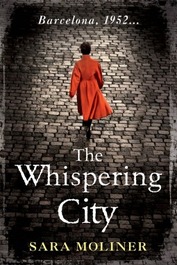
The challenge, of course, was that I’m not a great fan of police procedurals and a corpse on the carpet in the opening of a novel does little to whet my appetite. Yet I ploughed on, hoping to learn more about Spain in the way I’d learnt about Greece from another crime novel, Codename Xenophon. Unfortunately, I found The Whispering City rather slow going, and was well past the hundred-page mark before the two women got together and, for me, the real story began.
Although there were lots of street names cited, including the one where my friends had a flat in the early 1980s, I didn’t get a strong sense of the atmosphere of the city. What I did enjoy, although it could irritate readers unfamiliar with the country and its language, were the references to the Andalucían dialect (in which the ‘s’ at the end of words is not pronounced), something I found particularly striking on my first visit to the south. Nor did I learn a great deal about Franco’s dictatorship, other than that, as in any repressive regime, including that in North Korea, people could lose their jobs for fighting for the losing side, that they feared the police with good reason, and were careful not to share too much of their private thoughts.
But maybe that’s okay, as the theme of this novel extends beyond a city at a particular point in time to the challenges of facing the truth in many cultures. As Beatriz says (p222):
Knowing something and not being able to say it is the norm in this country. But not wanting to know something, intentionally shutting your eyes because it doesn’t suit you to see what you know, that’s opportunism.
Personally, I’m not convinced it is opportunism necessarily, but complacency, and the desire for an easy life. Even in the UK, unfortunately, whistleblowers get a raw deal, despite legislation supposedly supporting them to speak out. What do you think?
Winner of the English Pen Award, The Whispering City was first published under the title Don de Lenguas. The English translation, by Mara Faye Lethem (who seems to have a different idea to mine of the use of the word “whom”), is published by Abacus today. Thanks to them for my review copy.





















 RSS Feed
RSS Feed





















